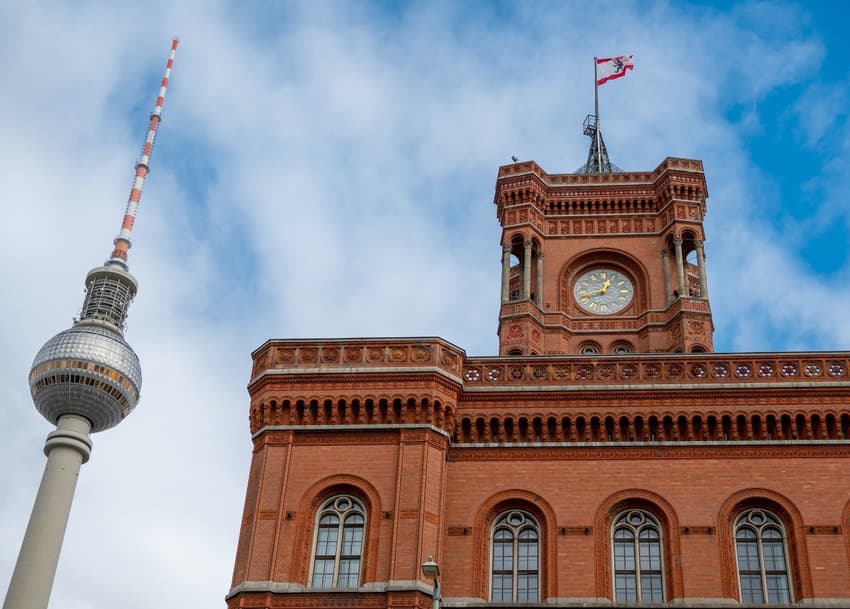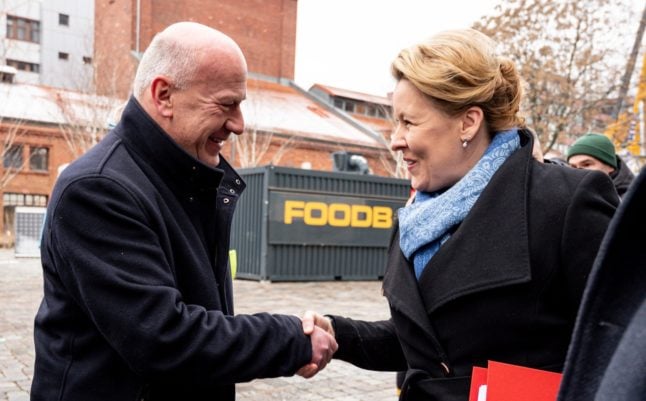'New direction': How Berlin is getting its first conservative-led government in decades

Members of the CDU and SPD have rubber-stamped their new 'Grand Coalition' in Berlin, paving the way for the first conservative-led government in Germany's capital for decades. Here's what you need to know.
What's happening?
On Monday, delegates from the conservative Christian Democratic Union (CDU) voted unanimously to form a coalition with the centre-left Social Democrats (SPD) in Berlin, putting an end to the city-state's previous SPD-led coalition, with the Left (Die Linke) and Greens.
It followed a member's poll on Sunday that saw party activists from the centre-left SPD narrowly vote through the coalition plans.
When the results came in on Sunday, 54.3 percent of the 12,000 eligible members had voted in favour of forming a state government with the CDU while 46.7 percent had voted against.
The news will see the CDU's Kai Wegner take the position of mayor in Berlin - the first time the office has been held by a conservative politician in more than 20 years.
It marks a sea change from the capital's previous left-leaning politics towards a more centrist direction for the city. It also follows an election re-run held in February after a botched voting day back in September 2021.
The new coalition pact, which will be formally signed on Wednesday, sets out plans to replenish housing stocks in the city, provide more nursery and school places and increase the numbers of police and firefighters.
The parties have also pledged to put climate protections centre-stage in the coming years.
Speaking ahead of the delegate vote on Monday, Wegner praised the unity of his party.
"United we can write history in Berlin," Wegner said. "Our Berlin will get a government that will govern our city better than has happened in the past six years."
READ ALSO: Berlin to get first conservative mayor in 20 years
Is everyone happy?
No. For the SPD, the decision to prop up the CDU as its junior coalition partner caused a huge amount of controversy.
Writing in TAZ last Wednesday as the vote was ongoing, eight activists from the party railed against the conservatives and the new coalition plans.
"With this coalition, we as the SPD are dwarfing ourselves and no longer delivering the necessary progressive potential," wrote Peter Maas, the head of the party's Juso (young socialist) wing. "The leaders of the CDU also stand for a policy of prevention that is not able to handle the big problems of the city."
But outgoing mayor Franziska Giffey (SPD) defended the new coalition, calling it a "new direction" for the city that would have an impact well beyond the next few years.
"I am very relieved, for the SPD, but also for our city," she said in a press conference on Sunday. "We now have the chance to take concrete action."
Why did Berlin have to repeat its elections?
The historic shift in Berlin's politics came on the back of a fudged election during the 'Super Wahltag' (Super Election Day) in September 2021.
On September 26th, three separate elections were held in the city for the federal parliament, state parliament and local councils, alongside a referendum on whether to take the properties of major landlords back under state control.
With the Berlin marathon happening on the same day, polling stations were left short of the ballots they needed, with many receiving voting slips with the wrong candidates on them or being forced to close in the middle of the day.

Kai Wegner (CDU) and Franziska Giffey (SPD) great each other ahead of coalition negotiations in Berlin. Photo: picture alliance/dpa | Fabian Sommer
Following a slew of complaints, Berlin's Administrative Court declared the state election and local election results invalid and called a re-run of the vote on February 12th this year.
The re-run election saw the CDU score a historic win in the capital with 27.5 percent of the vote - 10 points higher than its 2021 result. Meanwhile, the SPD slipped into second place with around 18 percent of the vote.
PODCAST: Has a decade of the AfD changed Germany, and why is Berlin repeating elections?
In his election campaign, Wegner had focused heavily on swaying residents in the outskirts of Berlin with pledges to brush up the city's ailing administrative system and crack down on anti-social behaviour.
But he also courted controversy when he suggested the people responsible for attacks on ambulance workers on New Year's Eve were primarily people with a migrant background.
Comments
See Also
What's happening?
On Monday, delegates from the conservative Christian Democratic Union (CDU) voted unanimously to form a coalition with the centre-left Social Democrats (SPD) in Berlin, putting an end to the city-state's previous SPD-led coalition, with the Left (Die Linke) and Greens.
It followed a member's poll on Sunday that saw party activists from the centre-left SPD narrowly vote through the coalition plans.
When the results came in on Sunday, 54.3 percent of the 12,000 eligible members had voted in favour of forming a state government with the CDU while 46.7 percent had voted against.
The news will see the CDU's Kai Wegner take the position of mayor in Berlin - the first time the office has been held by a conservative politician in more than 20 years.
It marks a sea change from the capital's previous left-leaning politics towards a more centrist direction for the city. It also follows an election re-run held in February after a botched voting day back in September 2021.
The new coalition pact, which will be formally signed on Wednesday, sets out plans to replenish housing stocks in the city, provide more nursery and school places and increase the numbers of police and firefighters.
The parties have also pledged to put climate protections centre-stage in the coming years.
Speaking ahead of the delegate vote on Monday, Wegner praised the unity of his party.
"United we can write history in Berlin," Wegner said. "Our Berlin will get a government that will govern our city better than has happened in the past six years."
READ ALSO: Berlin to get first conservative mayor in 20 years
Is everyone happy?
No. For the SPD, the decision to prop up the CDU as its junior coalition partner caused a huge amount of controversy.
Writing in TAZ last Wednesday as the vote was ongoing, eight activists from the party railed against the conservatives and the new coalition plans.
"With this coalition, we as the SPD are dwarfing ourselves and no longer delivering the necessary progressive potential," wrote Peter Maas, the head of the party's Juso (young socialist) wing. "The leaders of the CDU also stand for a policy of prevention that is not able to handle the big problems of the city."
But outgoing mayor Franziska Giffey (SPD) defended the new coalition, calling it a "new direction" for the city that would have an impact well beyond the next few years.
"I am very relieved, for the SPD, but also for our city," she said in a press conference on Sunday. "We now have the chance to take concrete action."
Why did Berlin have to repeat its elections?
The historic shift in Berlin's politics came on the back of a fudged election during the 'Super Wahltag' (Super Election Day) in September 2021.
On September 26th, three separate elections were held in the city for the federal parliament, state parliament and local councils, alongside a referendum on whether to take the properties of major landlords back under state control.
With the Berlin marathon happening on the same day, polling stations were left short of the ballots they needed, with many receiving voting slips with the wrong candidates on them or being forced to close in the middle of the day.

Following a slew of complaints, Berlin's Administrative Court declared the state election and local election results invalid and called a re-run of the vote on February 12th this year.
The re-run election saw the CDU score a historic win in the capital with 27.5 percent of the vote - 10 points higher than its 2021 result. Meanwhile, the SPD slipped into second place with around 18 percent of the vote.
PODCAST: Has a decade of the AfD changed Germany, and why is Berlin repeating elections?
In his election campaign, Wegner had focused heavily on swaying residents in the outskirts of Berlin with pledges to brush up the city's ailing administrative system and crack down on anti-social behaviour.
But he also courted controversy when he suggested the people responsible for attacks on ambulance workers on New Year's Eve were primarily people with a migrant background.
Join the conversation in our comments section below. Share your own views and experience and if you have a question or suggestion for our journalists then email us at [email protected].
Please keep comments civil, constructive and on topic – and make sure to read our terms of use before getting involved.
Please log in here to leave a comment.